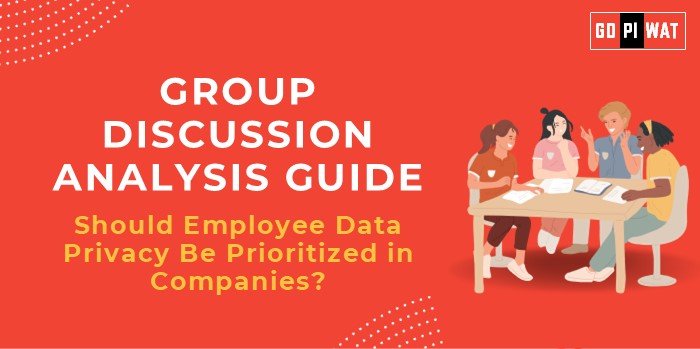📋 Group Discussion (GD) Analysis Guide: Should Employee Data Privacy Be Prioritized in Companies?
🌟 Introduction to the Topic
Opening Context: As businesses increasingly rely on digital tools and platforms, managing employee data has become both a legal and ethical priority. The debate around employee data privacy highlights a critical intersection of technological innovation, regulatory compliance, and workplace trust.
Topic Background: Employee data privacy concerns have surged in response to data breaches, regulatory frameworks like GDPR, and increasing remote work trends. This discussion explores whether safeguarding employee data should be a top company priority, considering operational, ethical, and competitive implications.
📊 Quick Facts and Key Statistics
- 🔓 Global Data Breaches (2023): 180+ million sensitive records exposed, highlighting vulnerabilities in data security.
- ⚖️ GDPR Fines (2022): €2.92 billion imposed, demonstrating the financial risks of non-compliance.
- 💻 Remote Work Growth: 74% of companies use tools that collect employee data, raising ethical concerns.
- 👥 Employee Trust Impact: 56% of workers express discomfort with workplace surveillance, emphasizing the importance of privacy for morale.
🤝 Stakeholders and Their Roles
- 🏢 Companies: Implement data collection policies, balance transparency with security, and ensure compliance.
- 👥 Employees: Expect privacy and ethical use of their personal information.
- ⚖️ Regulatory Bodies: Enforce data protection laws like GDPR and CCPA.
- 📱 Tech Providers: Offer secure solutions for managing sensitive data while minimizing surveillance risks.
🏆 Achievements and Challenges
✨ Achievements:
- ✅ Stronger Regulations: Frameworks like GDPR and CCPA enhance accountability.
- 🔒 Adoption of Best Practices: Companies like Apple and Microsoft prioritize user privacy, including employees.
- 📊 Technological Solutions: Tools like data encryption and anonymization mitigate risks.
⚠️ Challenges:
- 💰 Cost Implications: Implementing robust privacy policies requires significant investment.
- 🛡️ Cultural Resistance: Balancing productivity monitoring with privacy is contentious.
- 🌍 Global Compliance: Adhering to varying laws across jurisdictions complicates efforts.
🌍 Global Comparisons:
- 🇪🇺 Success in the EU: GDPR sets a high benchmark for employee data protection.
- 🌏 Struggles in Emerging Markets: Limited resources hinder robust implementation.
📌 Case Studies:
- 🤖 AI Surveillance in China: Raises ethical alarms despite boosting productivity.
- ⚖️ GDPR Violation (Meta, 2023): €1.2 billion fine showcases risks of non-compliance.
📄 Structured Arguments for Discussion
- 🟢 Supporting Stance: “Protecting employee data is not just a legal mandate but a moral imperative, essential for fostering trust and reducing liability.”
- 🔴 Opposing Stance: “Excessive focus on data privacy may hinder operational efficiency and innovation.”
- ⚖️ Balanced Perspective: “While employee data privacy is critical, companies must balance it with productivity and technological advancements.”
🚀 Effective Discussion Approaches
🔑 Opening Approaches:
- 📉 Highlight a recent case of a major data breach.
- 📊 Use a provocative statistic to emphasize the scale of employee monitoring.
- ⚖️ Reference ethical dilemmas tied to corporate surveillance tools.
🤔 Counter-Argument Handling:
Example: Cite frameworks like GDPR that balance privacy with business needs, and highlight case studies where privacy investments have driven long-term success.
📈 Strategic Analysis: SWOT
- 💪 Strengths: Builds trust, reduces legal risks, enhances brand reputation.
- ⚠️ Weaknesses: Implementation costs, potential conflicts with productivity goals.
- 💡 Opportunities: Competitive advantage, alignment with global standards.
- 🚧 Threats: Non-compliance penalties, data breaches.
📚 Connecting with B-School Applications
Real-World Applications: Link to organizational behavior, cybersecurity, or ethics courses.
📌 Sample Questions:
- 📋 “How can companies align productivity monitoring with privacy?”
- ⚖️ “Discuss the implications of GDPR on HR data practices.”
Insights:
- Importance of balancing ethics and profitability.
- Challenges of operating across jurisdictions.
- Emerging role of AI in data protection.


